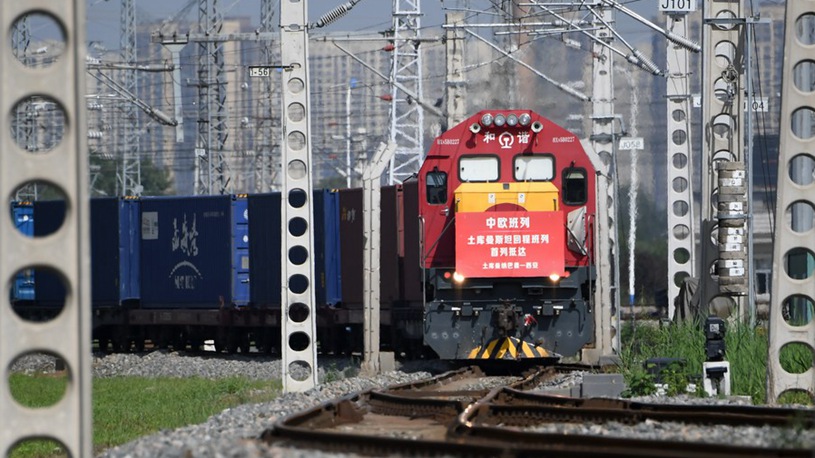Feature: Chinese-built water projects bolster living standards in Angola
LUANDA, Sept. 21 (Xinhua) -- Despite rich water resources from rivers and lakes throughout Angola, poor water quality and lack of water-related infrastructure in the country have long limited acess to safe drinking water for people and hindered development of industries.
However, things are changing for the better. Chinese companies have helped Angola develop hydropower stations, drought relief projects and water supply facilities and harness abundant water resources to grow the economy and raise living standards.
SAFER WATER, BETTER HEALTH
Inadequate access to safe drinking water in Angola has increased the risk of spreading infectious diseases like cholera and dysentery. "To bring safe drinking water to residents" has become a clarion call for Chinese companies based there.
A water supply project in the northwestern province of Cabinda, built by the China Railway 20th Bureau Group Angola International Company, was completed in June.
Zhu Qihui, chairman of the board of the group's subsidiary in Angola, said the project comprises 74 centralized water supply points, covering 24,000 households or 92 percent of the province's residential communities.
Zhu added that the project could supply water 24 hours a day, seven days a week, significantly relieving supply shortage facing local industries, schools and port transportation.
"It used to be a long walk to the well to fetch water, and the task was very grueling," said Adriano, a local resident who did not offer his full name, adding that more than 400 households in his community were impacted by water scarcity for decades.
"Now, the water pipe is connected to our doorstep, and we can use clean and hygienic tap water every day," Adriano said.
"Angola is not short of water, but the water resources are not used efficiently. Thanks to the Chinese companies, the situation is improving," said Angolan Minister of Economy and Planning Mario Augusto Caetano Joao.
"Chinese companies have brought technology and experience to improve local livelihoods and revitalize sustainable development," said the minister.
POSITIVE ECONOMIC EFFECT
The uneven temporal-spatial distribution of rainfalls in Angola has long been a daunting obstacle for farming and the economy.
For example, the southern Angolan province of Cunene is dry for nine months yearly.
Recalling an acute drought in 2018, Augusto, a local villager who did not provide his full name, said: "fields were cracked by the sun, thirsty livestock were everywhere, and countless people were forced to flee to the neighboring country of Namibia."
Nonetheless, seasonal drought no longer threatens residents after Lot 1 and Lot 2 of the Infrastructure Project to Combat the Effects of Drought in Cunene Province, implemented by the Power Construction Corporation of China (PowerChina), was commissioned in April.
With channels connecting the Cunene River and facilities such as water intake pumping stations and reservoirs, the project can transfer water from the river to dry areas, allowing for irrigation of arable land when rains fail.
The project can meet the water needs of 235,000 people and support irrigation for 5,000-hectare agricultural land, said Zhao Yong, general manager of the South and West Africa Branch of STECOL Corporation under PowerChina.
During a visit to the site in May, Abdulla Shahid, president of the 76th session of the UN General Assembly, said the global body would consider extending the project model to other drought-stricken countries and regions.
SOCIAL BENEFIT
The Kwanza River, one of the longest rivers in Angola that has nurtured generations of Angolans, is deemed the "mother river" of the African country.
With many tributaries, the river is plentiful in hydro energy potential, but how to unleash its potential was a chronic headache for locals until the launch of the Caculo Cabaca hydropower plant project, built by China's Gezhouba Group, about 200 km southeast of Angola's capital Luanda.
Dubbed the "Three Gorges Project in Africa," the project was initiated in August 2017, and now its construction is in full swing.
Upon the completion of the hydropower plant, it will meet more than 40 percent of the country's power supply demand and reduce greenhouse gas emissions by about 7.2 million tons annually.
The income from power generation will support the renovation of local infrastructure and natural conservation, and the reservoir will boost flood control capacity and enhance water resource utilization, said Chen Yonggang, the project manager.
Furthermore, Chen said that the hydropower project would create more than 6,000 local jobs and train a cadre of construction and management professionals for Angola.
"I appreciate the Chinese company for passing on a lot of engineering know-how, which is very important for the future development of Angola," said Nelito Jose, a local employee.
Since the establishment of the African Union in 2002, China and the union have worked hand in hand for 20 years. Projects like the ones mentioned above benefit livelihoods and epitomize China-Africa friendship and cooperation.
China and Angola, alongside other African countries, have always been close friends and brothers despite the geographic distance, Chinese Ambassador to Angola Gong Tao said.
"Where there is water, there is hope," said Gong. "Let the spring of hope keep flowing on the path of China-Africa friendship." ■
Photos
Copyright © 2022 People's Daily Online. All Rights Reserved.









